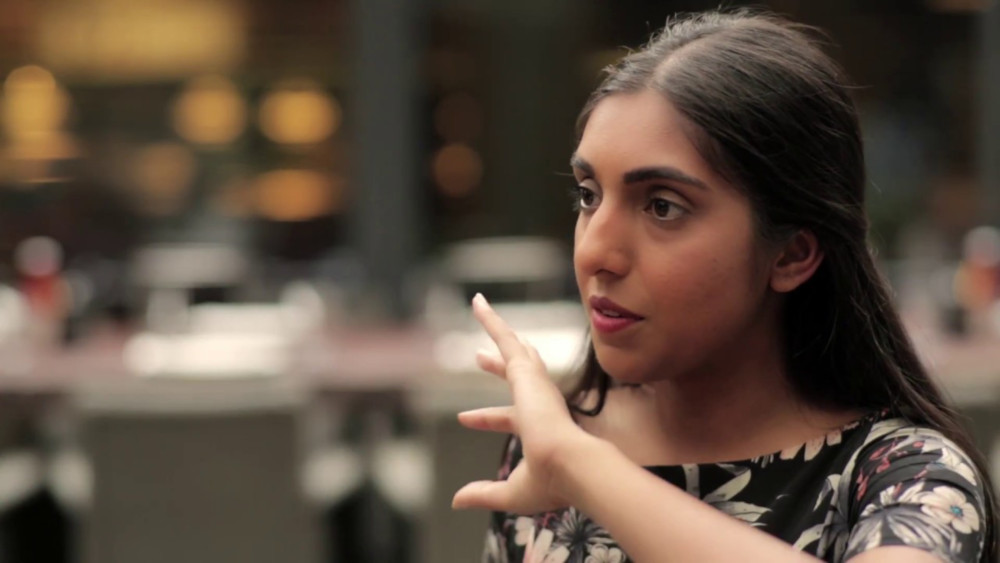Poetry isn’t dead — it’s just living its best life on social media.
Instagram has turned into a poetry hotbed. Users share a couple of aphoristic short lines composed to fit the platform’s square frame and followers, up to the tens of thousands, declare their love by liking the poem and reposting it on their own accounts.
Hashtags, such as #igpoets, #micropoetry, #poetryisnotdead, #poetryporn and many others, yield images of wonky typewritten love notes, neat digital maxims set atop a white backdrop and cursive confessional lyrics.
But is Instagram saving poetry, or wrecking it?
Many people credit Canadian writer and artist Rupi Kaur for poetry’s digital explosion and the subsequent spike in poetry book sales. In 2014, Kaur, then a rhetoric and professional writing student at the University of Waterloo, began posting pithy poems about race, identity and sexuality, pairing text with her own stark drawings.
Kaur currently boasts 3.6 million followers on her Instagram and her debut collection of poems and illustrations, Milk & Honey, sold over 2.5 million copies. This surge in online interest has led to an uptick in actual book sales, according to BookNet Canada and book sales monitors in the U.S. and U.K.
But reactions to Kaur are mixed. While some laud her poetic innovation, others regard her as a savvy entrepreneur, but hack writer.
Whether or not you connect with her work, Kaur’s rise is a fascinating story. A young Sikh woman from an immigrant family self-publishes her poems and drawings online, bypassing the traditional white literary establishment, and reaches an almost unheard of level of popularity.
Kaur may be the poster child for Instagram poetry, but other writers are also trying their hand at riding poetry’s new digital wave.
Harman Kaur (no relation to Rupi Kaur), a Punjabi Sikh spoken-word poet from Abbotsford, told CBC last year she decided to publish her work online because of the lack of diverse perspectives in her undergrad English curriculum.
Empowered by Rupi Kaur’s work, Harman Kaur added her voice to the internet poetry community. But after self-publishing a book of poems entitled Phulkari in 2018, Kaur disappeared from social media.
Atticus, an anonymous Canadian Instagram poet with 1.1 million followers and a couple of New York Times bestselling poetry books, began experimenting with Instagram poetry in 2013. The account for @AtticusPoetry primarily features black and white photographs of heterosexual couples amidst Parisian landmarks.
His introduction to poetry was unorthodox. On a trip to France, Atticus said he met American actor Michael Madsen, best known for his tough guy roles in Quentin Tarantino’s films. Atticus claims that it was Madsen who first introduced him to literature. As Atticus explains it, “He was this American badass and he’s writing poetry! I think for the first time in my life it gave me permission to explore writing.”

This unexpected encounter challenged Atticus’s ideas about masculinity and creative expression. “I grew up riding motorcycles, boxing and playing rugby. It was a huge departure for me. A few days later, I was in France, walking in Paris and I saw something that I thought was beautiful and I wrote about it. Soon after that I posted it on Instagram. I thought ‘I’ll share it. I’ll make it anonymous to keep it separate from my life.’ I started posting and I never expected it to turn into anything,” says Atticus.
Hailing from Vancouver and now based in Los Angeles, Atticus works with bygone American literary tropes — the romanticization of Paris bequeathed from Hemingway’s Lost Generation, the summer road trips of Jack Kerouac and the Beats. His brief and admittedly clichéd poems resonate with thousands of followers, many of whom tattoo Atticus’s words to their bodies. He even has his own brand of wine called Lost Poet that he hopes will stir the creative juices.
Amber McMillan, a poetry editor at Nightwood Editions and author of We Can’t Ever Do This Again and The Woods, remains critical about Instagram as a viable platform for poetry. She sees the potential for the internet to make poetry more open and relatable, but also defends traditional routes of publishing that require the time-intensive labour of receiving rejections from presses and journals and integrating feedback.
“Over-accessibility or the idea that ‘anyone can do it’ is a ubiquitous notion in all kinds of realms at the moment, and poetry — as it turns out — is not exempt from that thinking,” says McMillan. “It’s not surprising that [Instagram poetry] resonates with thousands or millions when we consider that inspirational quotes have made their way onto every coffee mug and T-shirt imaginable.”
Meanwhile, Ashley Obscura, publisher of Montreal’s Metatron Press and author of Ambient Technology and I Am Here, publishes poems on Metatron’s Instagram account as a means to engage with youth digital culture. Metatron’s #MicroMeta poetry series grew out of Obscura’s curiosity about how to use Instagram poetry to support her independent press. The #MicroMeta series features micro poems that read like gut-wrenching, yet comical texts sent from the bathroom of an existentially challenging Montreal loft party.
“For me, this is a new genre of poetry, one that synthesizes so much about contemporary society. I find the best of the micro poems I see as a sort of perfect fusion between a short poem, a journal entry, a bit of confessional and lyrical poetry, meme and digital culture,” explains Obscura.
Obscura says Instagram poetry reflects our culture and technology’s dynamic influence on language — we send short messages over text and nimbly flicker through different tones on social media. She believes in the internet’s radical ability to make space for marginalized writers to share their work. But she also worries about Instagram poetry’s shortcomings.
“The immediacy and shortness of the poems means that there are limits to how deep one can get in their thinking. I am an over-thinker, and so lately I’ve been worried that I am contributing to a lazy culture of reading. That I am not using my platform to promote deep and careful reading. Am I catering to the fast-pace of contemporary society by publishing quick hits of poetry?”
While the series has boosted Metatron’s Instagram profile, increasing followers and engagements with posts, Obscura has yet to see this translate into tangible benefits for the press.
Obscura approaches Instagram poetry with both excitement and skepticism. She’s hopeful about the form’s ability to lift up new voices and expand definitions of poetry, while also recognizing its limitations in terms of depth and long-term engagement.
“You can’t express much in an InstaPoem... but you can express something. And that is enough for me,” says Obscura. ![]()
Read more: Media

















Tyee Commenting Guidelines
Comments that violate guidelines risk being deleted, and violations may result in a temporary or permanent user ban. Maintain the spirit of good conversation to stay in the discussion.
*Please note The Tyee is not a forum for spreading misinformation about COVID-19, denying its existence or minimizing its risk to public health.
Do:
Do not: